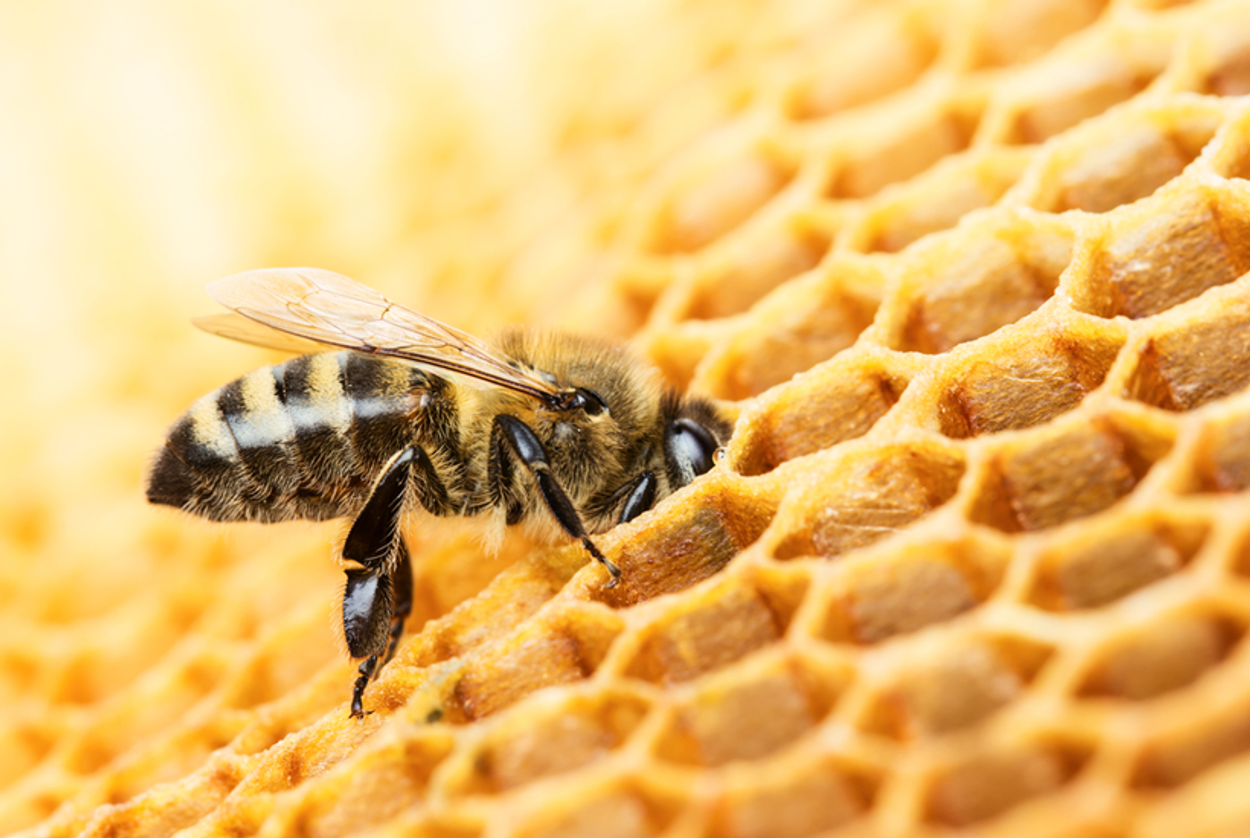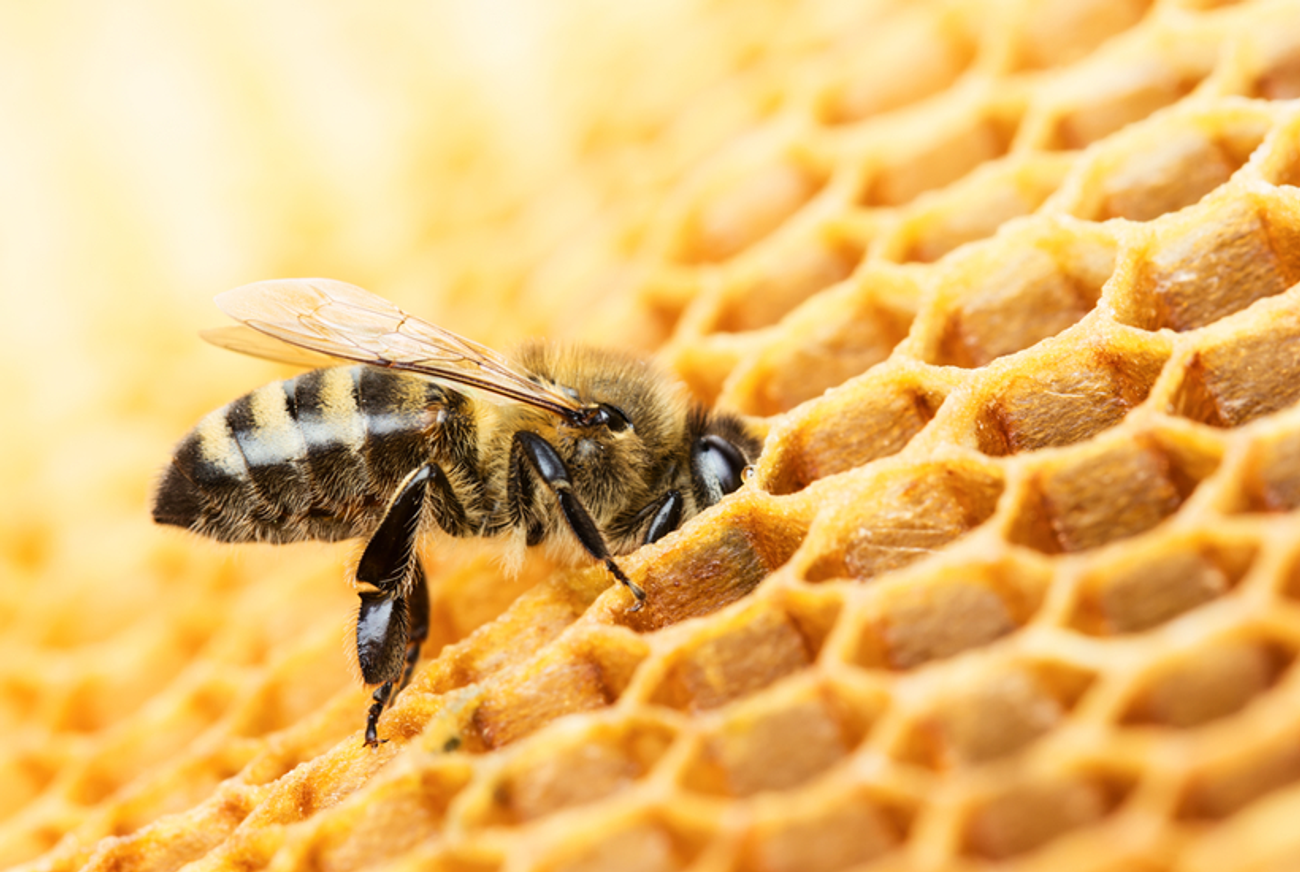Learning About the Birds and the Bees—and the Jews—on Rosh Hashanah
The value of Jewish laws regulating sex is evident in the honeybees that produce the honey we use to sweeten our new year




When I dip my apple in honey this Rosh Hashanah, I will remember the wild, raw, unbridled sexual energy of the bees—and I will think about Jewish sex.
My honey will come from Vermont’s Champlain Valley Apiaries, where this summer I witnessed the bees in the rough, in a fury, as they yielded the honey meant to sweeten my new year. I sneaked out of Middlebury Hebrew Language School to visit the apiary—as a reprieve from five hours of Hebrew class and three hours of homework a day, no English allowed. I didn’t expect to find a deeper understanding of Judaism there, but in the bees I discovered a clarification and reinvigoration of the dry and complex Jewish sexual laws I had been studying for years as I pursued a master’s degree in Jewish studies at the Graduate Theological Union in Berkeley. I saw the laws of niddah, the laws around sexual abstinence, and a call, no longer heard collectively, to infuse God and the divine into sexual engagement.
It is not a coincidence that we talk about “the birds and the bees” in reference to sex and mating. Religious groups for centuries have looked to the bees, in particular, to learn about channeling and bridling desire. Monastic groups often kept bees—cohesive mass producers—as reminders and teachers of how to redirect unused sexual energy.
Chaz Mraz, who runs Champlain Valley Apiaries, and a beekeeper named Levi took me inside the hive and told me about the bees’ specific and organized sexual system that makes honey possible. Drones mate with the queen before splitting in half and dying, but all other honeybees are nonreproductive and work their whole lives tending to the larvae, collecting pollen, protecting the queen, or performing any number of other highly specific jobs. Sexual energy that might otherwise be used for mating is proactively engaged in the production of honey and the maintenance of a well-ordered and tight-knit bee universe.
I watched the bees as they emitted a loud and almost palpable hum together. Honey oozed from the cells of their manmade hives. Chaz took a spatula and asked me to lift my veil, a hood protecting me from being stung, and fed me raw honey straight from the comb. I realized it was the abstinence that created the flow of things in this hive. In this organized and tempered sexual order, the nonmating bee’s redirected sexual energy reorganizes itself around highly efficient production within the hive itself. Bees thrive because they have an ordered sexual world.
My mind went straight to the laws of niddah and mikveh, still very much alive in Orthodox Jewish practice, although essentially abandoned by other modern permutations of Judaism. Niddah are the laws that dictate sexual engagement around the monthly menstrual cycle; when a woman has her period and for one week after, the couple is to abstain from sex and touching. Mikveh is the ritual cleansing that coincides with the timing of the laws of niddah.
For Jewish couples that observe the laws of niddah, half the month is then reorganized, redirecting sexual energy into the community, into the work of protecting the “queen”—the sanctity of the Sabbath. During the periods of abstinence, this energy is used to perform acts of tikkun olam, study Torah, or generally apply oneself toward the greater good of the Jewish collective. While bees produce honey, I like to think of Jewish laws around sex as yielding something, too: a sweet substance that comes in the form of tzekadah, of building community, and making the world brighter through devotional practice.
In her book Heavenly Sex: Sexuality in the Jewish Tradition, Dr. Ruth Westheimer quotes Rabbi Menachem Shneerson, the Lubavitcher Rebbe: “From the Sabbath, all the days of the week receive their blessings.” Dr. Ruth is actually referring to having good sex on Shabbat, to directing the sexual energy of the holy and the divine toward sexual engagement, and how this type of sex fuels a couple for the week to come. Abstinence, then, is coupled in intervals with ecstatic lovemaking. Sex becomes an organized and cautiously directed activity, driven by kavanah, or intention.
The concept of kavanah is the cornerstone of Jewish sexual law: Sex is to be something infused with the divine, something that works toward a higher order and in a collective way. When sexual activity desists, for those delineated two weeks a month, the energy is redirected toward the tafkid, the specific work that each individual is called to do. In this way, in the combination of abstinence and specific direction of sexual energy, so-called spiritual sparks are raised. This Jewish notion is what I saw in the honeybees, acted out through a collective order of abstinence and sexual engagement, cautiously arranged jobs, and work toward a common good.
Bees, like adherents to traditional Jewish law, are organized by a given tafkid, a purpose unique to their one body and life. There are the larvae, the feeders, the pollen-collectors, the maters, the gatherers, the guards, the attackers. Where Judaism and its many laws are organized to protect the Sabbath and raise the sparks of the divine, the highly specific organization of the honeybee colony centers around protecting the queen and maintaining continuous production.
This honey, these bees, this sexual metaphor for Jewish life and law is the very thing we take into our bodies in celebration of the Jewish New Year. Honey becomes the aphrodisiac and also the emblem of a species designed around the control of sex and the redirection of otherwise sexual energy toward a collective goal. In eating honey at the cusp of winter, we are actually putting flowers and bees inside our bodies, quite literally ingesting summer into ourselves to begin the darkest time of the year. But more important, ingesting honey becomes an emblem of using sex and intimacy in a cautious and directed way. It is about tempered sweetness, about intention behind sexual action, in or out of marriage—queer, straight, or in-between—and about the positive use of that same energy when not engaged in sexual activity.
I sneaked out of Hebrew school to visit the bees, but the lessons of Judaism were evident even inside their hive.
Merissa Nathan Gerson is a writer, sex educator, and rape prevention advocate. She teaches Alternative Journalism at Tulane University in New Orleans.